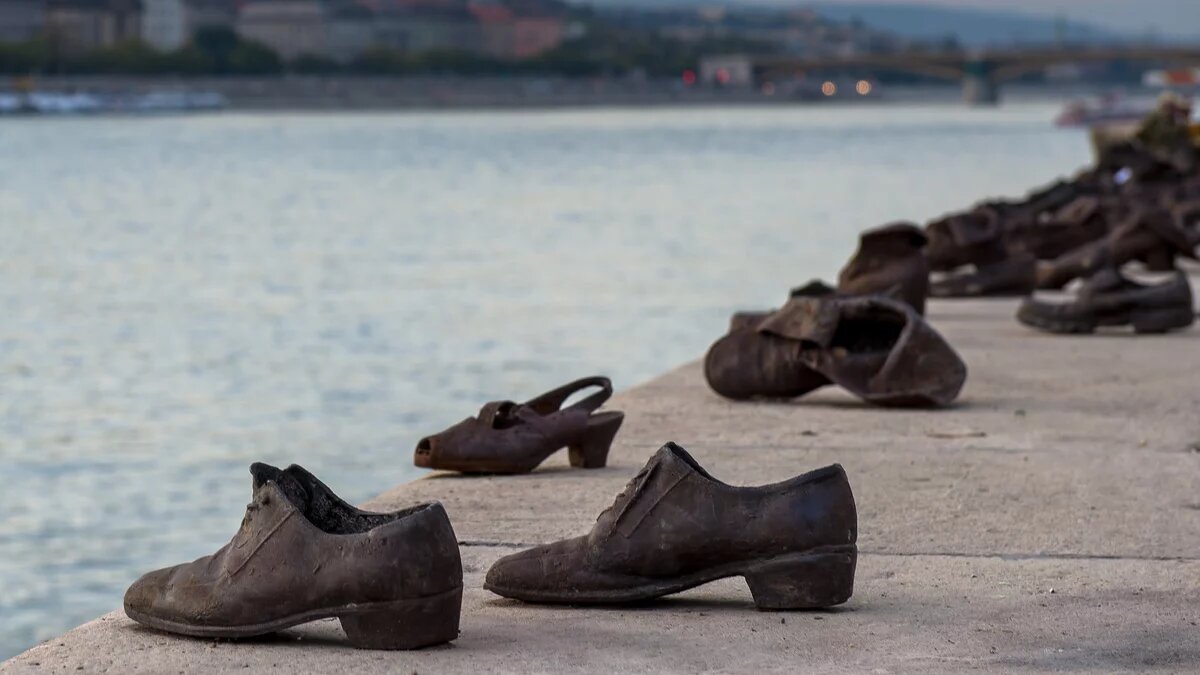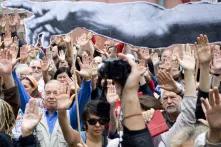The Holocaust narrative elevated the moral command of “Never Again” into a measure of universal integrity. But now a major paradigm change is happening in Holocaust memorialisation that will have a major impact on European identity.

“Europe reunited after bitter experiences” is how the Preamble of the European Constitutional Treaty (2004) begins. One can legitimately ask which experiences were those “bitter” ones? The term “bitter experiences” in the Preamble euphemistically refers to the events of the Second World War and the Holocaust, but recently this unfortunate generalisation has led to major consequences. Presently it is questionable whether the post-Second World War paradigm of European memory politics can be further sustained or will crumble under the attacks listed in this article.
In my paper, I argue that a major paradigm change is happening in Holocaust memorialisation that will have a major impact on European identity. What has thus far been a consensus about the Holocaust is being challenged not only by marginalised political actors, but also by governments and government-funded institutions. Holocaust researchers are attacked in Paris by their audiences, Hungarian governments are secretly setting up monuments and museums are whitewashing the past. This is a fundamentally new situation and therefore it requires fundamentally new strategies.
Let me firstly explain what is fundamentally new about this, then, in the conclusion of the article, I will suggest a good coping strategy for the academic community.
“Never Again” - measure of universal integrity
The Holocaust narrative that was conceived during the Cold War elevated the moral command of “Never Again” into a measure of universal integrity. The memory politics of the European Union was built on a positive normative notion, namely that learning from the past is a process through which a “bitter experience” may become a positive force. International organisations, such as the International Holocaust Remembrance Alliance (IHRA), have been monitoring whether individual states are committed to these values. Now this consensus is in danger.
In the past years, political scientists and analysts scrutinising the impressive series of electoral victories of illiberal powers have been forced to reconsider their conceptual tools when trying to understand the new phenomenon of “democratic authoritarianism”, ”hybrid regime”, “illiberal state” or “mafia state”. Together with the Polish sociologist Weronika Grzebalska, we compared Hungary and Poland and on the basis of our findings, we argued that we are facing a new form of governance, which stems from the failures of globalised (neo)liberal democracy. Based on its modus operandi, we called this regime an “illiberal polypore state” because, as a parasite, it feeds on the vital resources of the previous political system, and at the same time , actively contributes to its decay by setting up parallel institutions and redirecting resources into them. The polypore state, by controlling hegemonic forms of remembrance, works within the framework of what is referred to as “mnemonic security”. This is especially true of the memory of the Second World War and the Holocaust – polypore states set up lavishly funded new historical research institutes and museums which have no quality assurance and decrease the state funding of pre-existent internationally recognised institutions.
The paradigm change in Holocaust memorialisation consists of nine elements:
1. Nationalisation of the transnational Holocaust narrative. Memory has multiple levels and the local, regional, national and transnational memories together create a multi-coloured patchwork. As there is no narrative that could harmonise nation-focused historiography and the memories of the various groups of survivors, the construction of national-only remembrance supports illiberal nation-building and silences the voices that “do not fit”.
2. The de-Judaisation of the Holocaust narrative. This process makes Jewish victims invisible, because their experiences are presented as marginal, while the suffering of the nation as such is being stressed (see point 1). It has been widely discussed how post-1945 anti-fascist rhetoric invisibilised Jewish identity and the Jews as a group. History seems to be repeating itself: according to the illiberal states’ memory rhetoric, all survivors are victims, while the perpetrators, especially the “local” perpetrators, are conveniently forgotten.
3. Establishment and enforcement of the competing victimhood narrative, i.e. the canonisation of the narrative of “double occupation,” which relegates all responsibility to the occupying German and Soviet forces.
4. The replacement of the Cold War’s fundamentally secular memory paradigm with a religious framework of remembrance. In his speech of 4 July 2014, Hungarian Minister of Defence Csaba Hende stated that the goal of the Holocaust Memorial Year was that the Shoah would “take its place in national history,” adding: “may the Eternal help us.” With this he also summarised the goals of the paradigm shift in Holocaust memorialisation: to replace the international and supranational framing of the Holocaust with a national one, and its laic framework with a sacral one.
5. Another unstated aim of the Hungarian government with the Holocaust Memorial Year – in accordance with its general freedom-fighter rhetoric – was to establish its own Holocaust terminology. When the Hungarian Fidesz-Christian Democratic People's Party (KDNP) government rejected the “Never Again” discourse, they did so arguing that it is a tool of “western hegemony”, which necessarily objectifies the Hungarian narrative. In a related experiment, Sándor Szakály, the director of the government-funded Veritas Historical Research Institute, attempted to introduce the expression “police action against aliens” for a 1941 massacre, when thousands of Jews were killed with the active participation of Hungarian authorities. Certainly, further battles will follow, but presently it seems that the government will manage to nationalise the Hungarian Holocaust narrative without acknowledging Hungarian collaboration in war crimes.
6. According to the new paradigm, memory is not a constant flux but something that should be closed down permanently. On 28 April 2014, Tibor Navracsics, Deputy Prime Minister, Minister for Public Administration and Justice stated: "After having processed the tragedy of the 20th century, having learned from the tragedy of the 20th century, we should move on to the 21st century." The idea that the Holocaust would be something that can be ended and shut into the past is the diametric opposite of the memory continuity intrinsic to the “Never Again” model, which was the foundation of the global Holocaust narrative as well as of the European human rights paradigm. This is the continuity that the government wants to disrupt. The survivors and the Jewish community rightfully feel that the Hungarian government’s attempt at closure is a dismissal of their memories. Such memorialisation of the Holocaust is indeed a form of silencing, because it aims at closing a chapter in history in order to move on.
7. Double speech: sending different messages depending on the audience, i.e. for international organisations or norm owners like Israel or the US. Because of the Janus-faced performance of the Hungarian government during the Memorial Year (i.e.: that on the international stage they made speeches befitting all international expectations and standards, such as the speech of President Áder during the March of the Living in Auschwitz on 29 April 2014, while their actions in Hungary pointed in the opposite direction: they erected controversial monuments, gave state awards to openly anti-Semitic intellectuals etc.), different experts came to different conclusions, instead of recognising that this double performance is the modus operandi of the illiberal polypore state.
8. Anti-intellectual attacks against the legitimacy of science. In the illiberal states, government appointments can turn almost anybody into an expert historian, no previous credentials or training are needed except loyalty to the regime.
9. Self-censorship of historians. If historians censor the texts of their colleagues afraid that otherwise Századok, the oldest and most prestigious Hungarian historical journal might lose its financial support; if the Hungarian Historical Society (MTT), the first professional organisation founded in 1867 refuses to post anything Holocaust-related on its mailing list, claiming that “it is not relevant” for their members; if the Hungarian Academy of Sciences (HAS) omits Holocaust-related information from its own institutional history, then we should conclude that European “bitter experiences” have been reconceptualised by self-censorship and fear.
What have we done wrong?
A recent study shows that although education about the Holocaust is increasingly institutionalised and there are more and more relevant study programmes and research institutes, ignorance about the Holocaust has never been greater. Holocaust educators and researchers, what have we done wrong if, in spite of all the funding that was put into Holocaust education, the result is ignorance and an illiberal paradigm change? The founders of Holocaust research have been fundamentally concerned with the community of remembrance: with ordinary people. Increasing the outreach of Holocaust research in an understandable language can be one of the responses to these challenges. As the President of the Subcommittee on the History of the Second World War at the HAS, I am proudly sharing a good practice: doing podcasts. In our podcasts, we talk with scholars doing interesting work, in a language accessible for the wider public. The series is very popular; the first 9 episodes received more than 50 thousand clicks. I consider that this is a good start for increasing the visibility and outreach of high level and uncensored scholarship, making the listeners think about the consequences of the changes in the European Holocaust paradigm.
